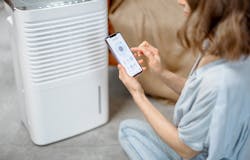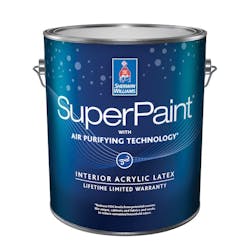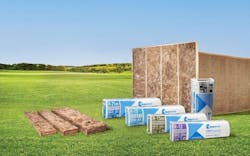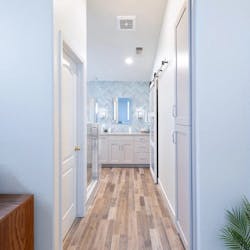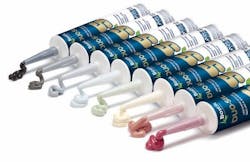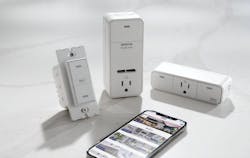Low-VOC Products for a Safe, Healthy Home
Volatile organic compounds, otherwise known as VOCs, are man-made chemicals produced during the manufacturing process of paints, pharmaceuticals, and refrigerants. According to the Environmental Protection Agency (EPA), they’re emitted by thousands of common household products currently on the market.
Some manufacturers are working to limit and even restrict VOC concentrations in new product formulas to provide safer alternatives for health-conscious consumers, while others are introducing technology to track VOC levels inside the home.
Air-Purifying Paint
VOCs are a common ingredient in solvent-based paints because they preserve the liquid and prevent it from sticking to the can over time, but long-term exposure to paint-based pollutants can cause “eye, nose, and throat irritation; headaches and loss of coordination; nausea; and damage to the liver, kidneys, or central nervous system,” according to the Minnesota Pollution Control Agency. In addition, some VOCs present in paint products are suspected or proven carcinogens.For a safer option that claims to not only improve indoor air quality but also eliminate household odors, Sherwin-Williams recently released an interior acrylic paint manufactured with a zero-VOC formula. The SuperPaint line reduces additional pollutants in potential sources such as carpet, cabinets, and fabrics and includes antimicrobial agents that prevent mold and mildew from growing on the painted surface.
Formaldehyde-Free Insulation
Insulation is often treated with fire-retardant chemicals that can leak VOCs into the air when indoor or outdoor temperatures fluctuate. Products such as Knauf’s Ecobatt Insulation offer the thermal and acoustic properties of traditional insulation while reducing VOC emissions with a formaldehyde-free binder.With its patented ECOSE technology that reduces embodied energy with a formaldehyde-free binder, Knauf’s Ecobatt Insulation products are LEED certified, GreenGuard Gold certified, and Energy Star rated, the company says.
Vinyl Plank Flooring
In recent years, vinyl flooring has become a popular choice among homeowners looking to freshen up their floors without breaking the bank, but many contain dioxins that are harmful to human health and also bad for the environment.Vinyl flooring products manufactured by Proximity Mills are FloorScore, GreenGuard, and Benchmark-certified as either low-VOC or completely VOC-free and surpass California’s standards for indoor air quality, the company says. In addition, Proximity Mills claims its luxury vinyl plank floors are mold-resistant, entirely phthalate-free, and can be easily sanitized.
Low-VOC Sealants and Adhesives
In sealant and adhesives, VOCs work as solvents or thinners that bind together all of the ingredients so the final product can adhere to various building materials, but not all VOCs are considered toxic. SealantsDirect provides low-VOC caulk, sealants, and adhesives, and the remaining chemicals contain no toxic air contaminants or hazardous air pollutants, the company says.Similarly, Uline’s heavy-duty spray adhesives are reportedly formulated to have a lower volatile organic compound content than traditional adhesives and are compliant with VOC regulations in all 50 states.
Air Quality Monitors
Even by replacing traditional products with healthier VOC-free alternatives, limiting harmful pollutants inside the home is easier said than done. The first step in reducing the presence of household toxins and chemicals is identifying them. That’s where indoor air quality monitors come into play.
Lennox’s Smart Air Quality Monitor detects and tracks particulates, carbon dioxide, and volatile organic compounds inside the home. When poor-quality air is detected, it triggers the system to circulate and clean the air with on-demand ventilation. The fully automated system uses real-time air readings to purify interior spaces throughout the day, but it’s not the only air purifier on the market designed to target VOCs.Broan-NuTone recently released Overture, a fully automated, whole-home fresh air system that uses sensor technology to continuously monitor for indoor air pollution caused by increased humidity, VOCs, smoke, carbon dioxide, and small particles (PM2.5). When a pollutant is detected, the system will automatically turn on the nearest ventilation fan and range hood to filter out the unhealthy air while simultaneously bringing in fresh, clean air from outside.
